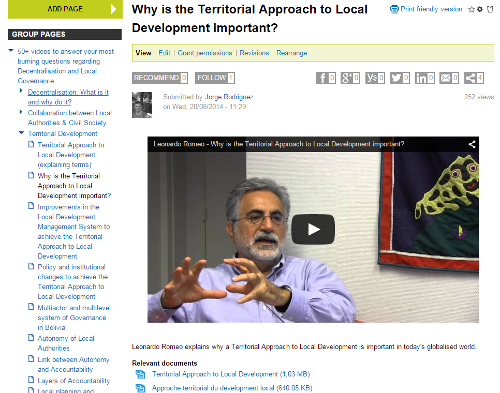Decentralisation as a political process has existed for decades, though with mixed results in improving people’s lives. Many reforms failed to promote local development because they were not designed to do so. As Andrés Rodríguez-Pose, Professor of Economic Geography at the London School of Economics, emphasised to staff from the European Commission’s International Cooperation and Development arm DEVCO at a recent meeting in Brussels, decentralisation and development are not the same.
"The way decentralisation has been done in the developing world has been an absolute disaster for development,” Dr Rodríguez-Pose said. “[Decentralisation] has been done mainly top-down, in which national governments have basically decentralised powers but not decentralised resources."
The result, Dr Rodríguez-Pose said, is unfunded mandates – authorities below the national level “trying to do things for which they are ill-prepared and have no resources".
That’s where the Territorial Approach to Local Development (TALD) comes in.
What is the Territorial Approach to Local Development?
According to a policy note prepared for DEVCO by Leonardo Romeo, Adjunct Professor of International Development Planning at New York University, TALD is a policy framework providing the key ingredients to translate decentralisation reforms into development outcomes.
The policy note defines TALD as a “national policy that promotes endogenous, integrated, multi-scalar and incremental local development”.
‘Endogenous’, because local authorities are given the autonomy to reach out to a range of other local actors to make the most of existing political and institutional resources. ‘Integrated’, because of the need to coordinate the work of state agencies, civil society and the private sector in a given territory (thus avoiding sectoral fragmentation of development interventions). ‘Multi-scalar’, meaning there must be mechanisms to allow for cooperation between those implementing national and local policies. And ‘incremental’, because local authorities do not just improve the national development agenda, but also bring to bear additional resources.
Under this framework, the primary responsibility for planning, financing and managing local development falls to local authorities. Prof. Romeo said these must be accountable and autonomous, “empowered with the ability to […] improve the efficiency of national resources and generate new ones”.
"If you don't give autonomy to local authorities you are basically saying [...] that you are content with your handling of development and neither need their help to improve the efficiency of your resources, nor do you need their help to give you additional resources,” Prof. Romeo said. “If you decentralise without autonomy you are setting the stage for not producing any local development.”
| Watch Professor Leonardo Romeo of New York University explain the Territorial Approach to Local Development here. |
Why is TALD necessary now?
The Communication on Empowering Local Authorities in partner countries for enhanced governance and more effective development outcomes, adopted in May 2013, reflects the ambition of the EU to fully recognise the developmental role of local authorities as expressions of local political constituencies in a given territory, and to support decentralisation as an instrument for better results. The Communication identifies a wide range of proposals to implement this agenda, including the promotion of local development through a territorial approach.
Although the concept of territorial development is not new, there is confusion on what it actually means and how it can be effectively supported.
As a first step, DEVCO commissioned the policy note on the subject. It then organised an internal workshop in Brussels last December, bringing together EU staff from various walks of life as well as international experts. The main purpose of the meeting was to build a shared understanding on the concept of TALD: its potential, practical meaning and feasibility.
The interest of the EU in TALD reflects evolutions in international debates on how to promote economic growth, social cohesion and environmental sustainability. Prof. Romeo said over the last five years more thought has been given to addressing spatial imbalances, whereby some areas prosper (partly due to natural, human, social and institutional resources) and others lag behind.
"If you remember the World Development Report of the World Bank in 2009, basically the message was, 'why care about spatial imbalances? They are the price you are paying for development'.” Now, “people are starting to realise that spatial inequalities are not only bad for social cohesion, they are bad also for growth. Therefore, the argument is turning in the other direction that maybe we should be concerned about spatial inequalities and we should try to correct them. Maybe the problem was with how we did it and the instruments we were using to do it."
Challenges to implementing the Territorial Approach
The first pilots of TALD will take place in 2016. Considering the interest in the topic, DEVCO will organise follow-up activities, including more operational guidance on how to support TALD, a seminar in Brussels for EUD/HQ staff, and region-specific TALD seminars to be held between May and October 2015. This will allow the first TALD pilot experiences to take place in 2016. These projects will then be evaluated, and if found to be successful, replicated elsewhere.
The Brussels seminar gave experts the chance to give their views on the challenges DEVCO will face in implementing TALD.
“We have to be more careful about not just reinforcing the power of local authorities that in many cases are not really local authorities,” said Jules Nguebou, an independent consultant. “In Africa for example, you can see many people managing local authorities are at the same time coming from the central administration or central government, so they manage the two responsibilities.” Hence, “we have to work on reinforcing citizenship, reinforcing the capacity of populations to produce their authority and to control the way that authorities are managing public policies”.
Another challenge is the proliferation of layers of government. Prof. Romeo gave the example of Yemen, “where they want to federalise the country and create six regions, and that is basically to reproduce by six the central state”.
“They are going actually to compromise the perspective of local development because under a federal system the local authorities will be basically cut from the support that they now receive from the central authority."
In implementing TALD, ownership of the process by local actors is key. This calls for bottom-up approaches to developing a shared vision and context-specific implementation strategies. For Prof. Romeo this clearly implies that “local development planning is not the localisation of the national plan”.
| For more information about TALD and Decentralisation head to capacity4dev’s Public Group on Public Sector Reform & Decentralisation. There you will also find an extended summary of the TALD seminar of 9 December 2014. |
This collaborative piece was drafted with input from Jorge Rodriguez Bilbao from DEVCO, with support from the capacity4dev.eu Coordination Team. Teaser image courtesy of Darron Raw.



Log in with your EU Login account to post or comment on the platform.